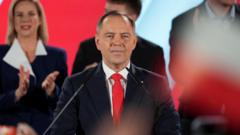An increasing number of Ukrainian refugees in Poland report troubling instances of discrimination and abuse as political tensions escalate ahead of the upcoming presidential elections. While many Poles initially offered support following the invasion of Ukraine, recent statistics indicate a shift in public sentiment, with a decrease in favor of accepting Ukrainian refugees and a rise in xenophobic actions.
Rising Tensions: Ukrainian Refugees in Poland Face Discrimination Amid Growing Anti-Ukrainian Sentiment

Rising Tensions: Ukrainian Refugees in Poland Face Discrimination Amid Growing Anti-Ukrainian Sentiment
As anti-Ukrainian sentiment rises in Poland, many refugees recount experiences of bullying and xenophobia, placing strain on communities that once welcomed them.
Ukrainian refugees, who had initially found solace in Poland, are now facing a disheartening rise in discrimination and xenophobia, according to recent reports. As the country prepares for a pivotal presidential election, long-standing support appears to be waning, giving way to harassment and hostility in public spaces, especially among schoolchildren.
Svitlana, a Ukrainian mother, shares that her daughter, who previously enjoyed school life, has recently become a target of bullying. "One boy told her, 'Go back to Ukraine'," Svitlana noted, adding that this incident followed a devastating missile attack in their hometown, which had left them traumatized. Concerns about the safety and acceptance of Ukrainians are echoed by others, as they recount experiences of verbal abuse and unfounded accusations suggesting that Ukrainians are disruptive.
Poland now hosts approximately 2.5 million Ukrainians, accounting for nearly 7% of its population. Initially met with warmth and compassion, the dynamics have begun shifting, attributed to increasing tension surrounding a polarized presidential race. Activist Natalia Panchenko from the 'Stand with Ukraine' Foundation emphasizes a worrying trend: anti-Ukrainian sentiment, previously confined to online abuses, is becoming commonplace in real life, complicating the everyday realities of those seeking refuge from war.
Recent surveys indicate a decline in the acceptance of Ukrainian refugees, with only half of Poles supporting their continued presence, a significant drop from 81% two years ago. The political landscape has also shown shifts, as candidates jockey for votes by either downplaying or outright rejecting Ukrainian support while grappling with a disinformation campaign allegedly orchestrated by Russian entities.
Concerns that misinformation is influencing public perceptions are voiced by those monitoring the situation. Michal Marek, who keeps track of propaganda narratives, believes that negative portrayals of Ukrainians are gaining traction, heightening the risk of xenophobic acts going unchecked.
As the election approaches, traditional networks of Ukrainian support are becoming increasingly strained. While many remain hopeful of the Polish people's compassion, the atmosphere of uncertainty looms large for these war-affected families. The upcoming elections will serve as a pivotal moment, shaping not just the political future but also significantly impacting the lives of those who sought sanctuary in Poland.






















